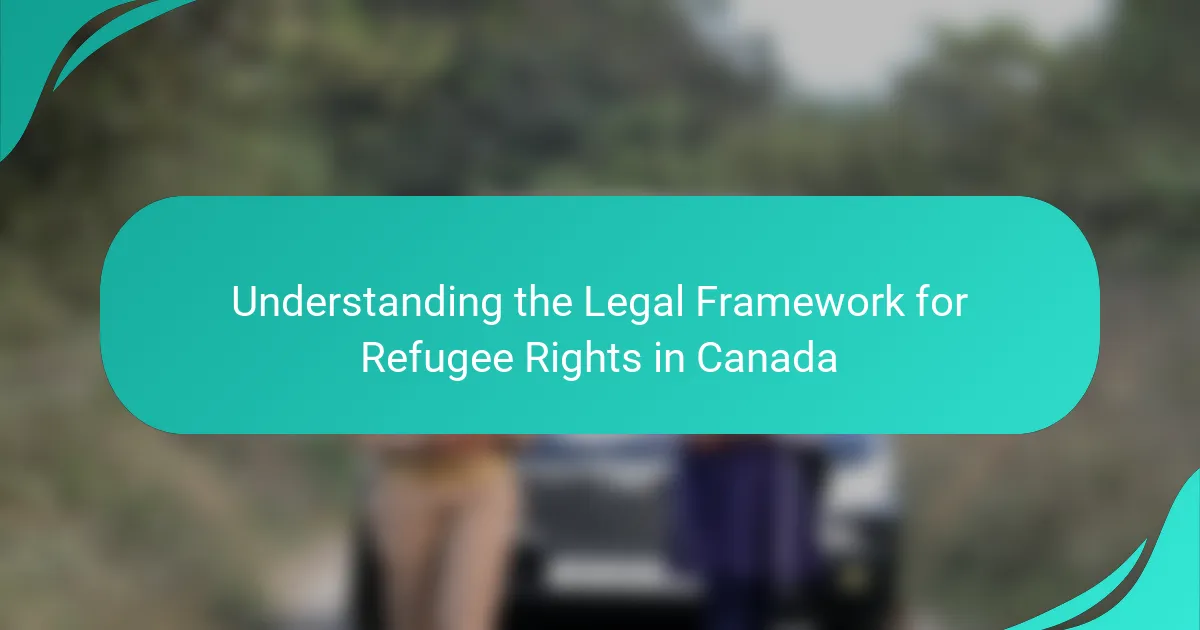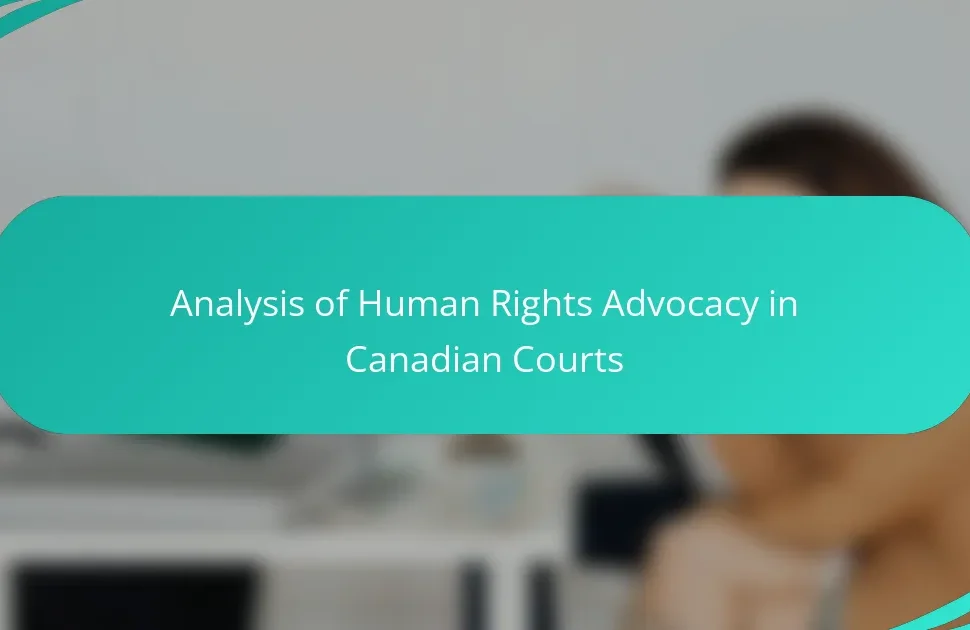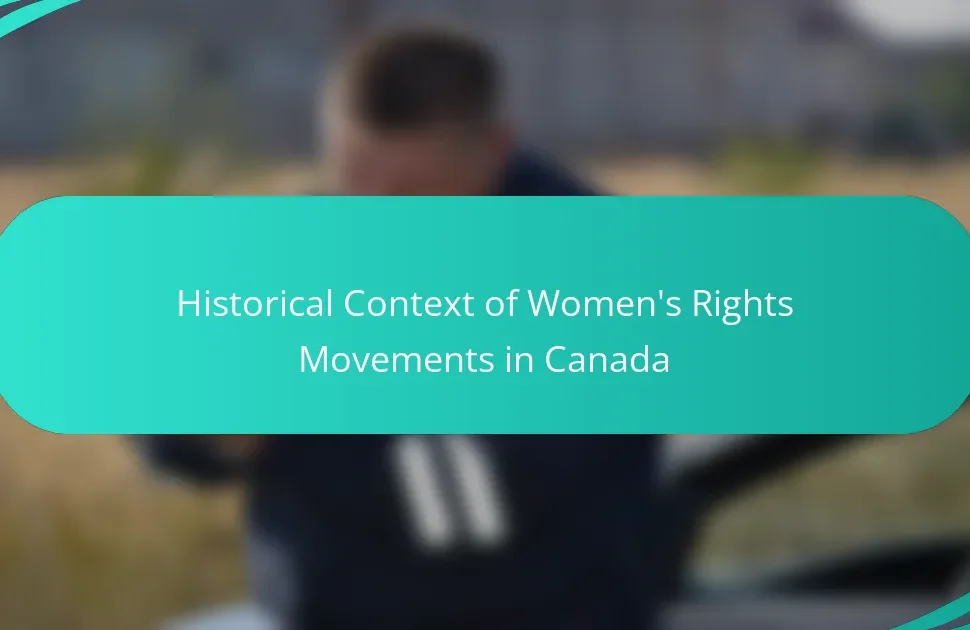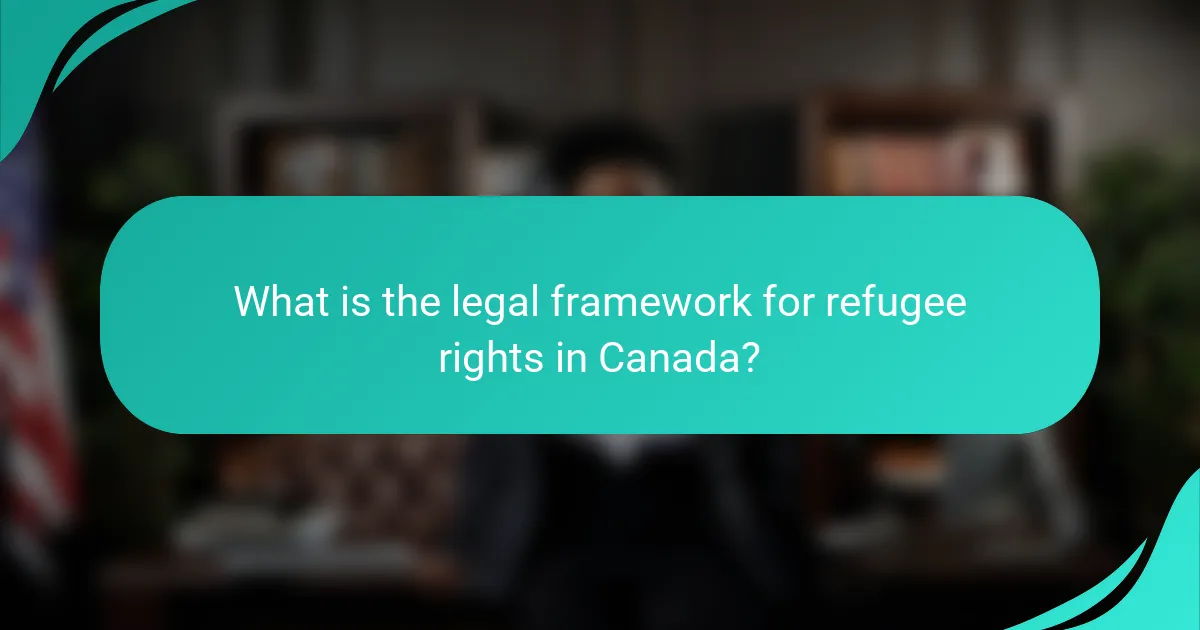
What is the legal framework for refugee rights in Canada?
The legal framework for refugee rights in Canada is primarily governed by the Immigration and Refugee Protection Act (IRPA). This act outlines the process for claiming refugee status and the rights of individuals seeking protection. It incorporates international obligations, including the 1951 Refugee Convention. Under IRPA, refugees are entitled to protection from persecution based on race, religion, nationality, political opinion, or membership in a particular social group. The framework also includes provisions for fair hearings and the right to appeal decisions. Additionally, the Canadian Charter of Rights and Freedoms safeguards the rights of refugees within the legal system. These laws ensure that refugees receive humane treatment and access to necessary services while their claims are processed.
How does the legal framework define refugees?
The legal framework defines refugees as individuals who are outside their country of nationality. They are unable or unwilling to return due to a well-founded fear of persecution. This persecution must be based on race, religion, nationality, membership in a particular social group, or political opinion. The 1951 Refugee Convention and its 1967 Protocol provide the foundational definitions. Canada adheres to these international standards through its Immigration and Refugee Protection Act (IRPA). Under IRPA, refugees are granted protection if they meet the specified criteria. This legal definition ensures that individuals fleeing danger receive the necessary support and rights.
What are the criteria for refugee status in Canada?
To obtain refugee status in Canada, an individual must demonstrate a well-founded fear of persecution. This persecution must be based on race, religion, nationality, political opinion, or membership in a particular social group. The individual must also prove that the government in their home country is unable or unwilling to protect them from this persecution. Additionally, the claimant must make their application within a reasonable timeframe after arriving in Canada. These criteria align with the 1951 Refugee Convention, which Canada has ratified.
What legal instruments support refugee rights in Canada?
The legal instruments that support refugee rights in Canada include the Immigration and Refugee Protection Act (IRPA), the Canadian Charter of Rights and Freedoms, and international treaties such as the 1951 Refugee Convention. The IRPA establishes the framework for refugee protection and outlines the processes for refugee claims. The Canadian Charter guarantees fundamental rights and freedoms, including the right to life, liberty, and security. The 1951 Refugee Convention, to which Canada is a signatory, sets out the rights of refugees and the obligations of states to protect them. These instruments collectively ensure that refugees in Canada are afforded legal protections and rights.
Why is the legal framework important for refugees?
The legal framework is crucial for refugees as it establishes their rights and protections. This framework ensures that refugees have access to asylum procedures and legal recourse. It also provides guidelines for their treatment and integration into society. In Canada, legal protections are outlined in the Immigration and Refugee Protection Act (IRPA). This act mandates fair hearings and prohibits refoulement, or forced return to danger. Additionally, international agreements like the 1951 Refugee Convention reinforce these rights. These legal structures help prevent discrimination and abuse against refugees. They also promote social stability by ensuring refugees can contribute positively to their new communities.
How does it protect refugees from persecution?
The legal framework for refugee rights in Canada protects refugees from persecution through various laws and policies. The Canadian Refugee Protection Act allows individuals to claim asylum based on a well-founded fear of persecution. This law ensures that refugees have access to a fair hearing before the Immigration and Refugee Board. Canada also adheres to international treaties, such as the 1951 Refugee Convention, which obligates the country to protect those fleeing persecution. Additionally, the Canadian Charter of Rights and Freedoms guarantees fundamental rights, including the right to seek protection from persecution. These protections are reinforced by legal aid services that assist refugees in navigating the asylum process. Thus, Canada’s legal framework provides comprehensive protection against persecution for refugees.
What role does it play in ensuring access to services?
The legal framework for refugee rights in Canada plays a crucial role in ensuring access to services for refugees. It establishes the rights of refugees to seek asylum and receive protection. This framework includes provisions for healthcare, education, and social services. Legal protections prevent discrimination and promote equal access to these services. For example, the Immigration and Refugee Protection Act guarantees refugees access to essential health services. Additionally, organizations like the Canadian Council for Refugees advocate for the rights of refugees to access necessary support. This comprehensive legal structure facilitates the integration of refugees into Canadian society.
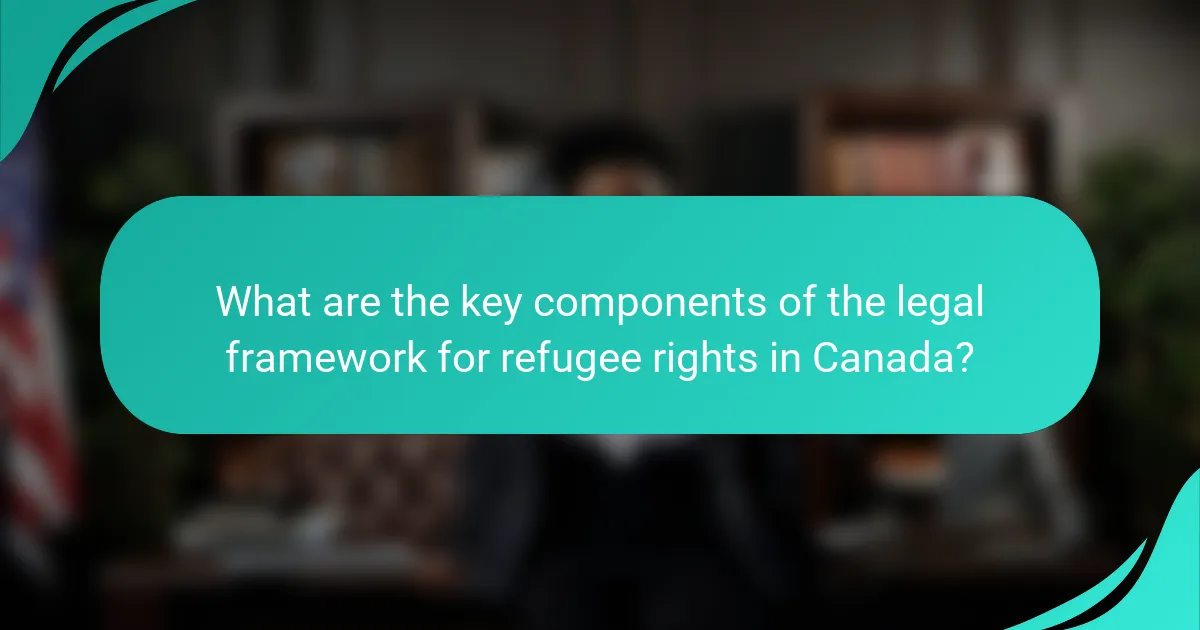
What are the key components of the legal framework for refugee rights in Canada?
The key components of the legal framework for refugee rights in Canada include the Immigration and Refugee Protection Act (IRPA), the Refugee Protection Division (RPD), and the Canadian Charter of Rights and Freedoms. The IRPA establishes the legal grounds for refugee status determination and protection. The RPD is responsible for assessing claims and granting refugee status. The Canadian Charter guarantees fundamental rights and freedoms, which apply to all individuals, including refugees. These components ensure that refugees have access to legal protections and a fair process in Canada. The framework is designed to uphold Canada’s commitment to international refugee obligations as outlined in the 1951 Refugee Convention.
How does the Immigration and Refugee Protection Act (IRPA) function?
The Immigration and Refugee Protection Act (IRPA) governs immigration and refugee matters in Canada. It establishes the legal framework for processing applications, determining eligibility, and granting protections. The IRPA outlines the rights and responsibilities of immigrants and refugees. It includes provisions for temporary and permanent residency. The Act also details the procedures for refugee claims and appeals. Enforcement measures against non-compliance are specified within the legislation. The IRPA aims to balance humanitarian concerns with national security. It reflects Canada’s commitment to protecting vulnerable populations while managing immigration effectively.
What are the main provisions of the IRPA regarding refugee claims?
The main provisions of the Immigration and Refugee Protection Act (IRPA) regarding refugee claims include the establishment of the criteria for refugee status, the processes for making claims, and the rights of claimants. The IRPA outlines that individuals may make a claim for refugee protection based on a well-founded fear of persecution. This includes persecution due to race, religion, nationality, political opinion, or membership in a particular social group.
The Act also specifies the procedures for processing these claims, including the role of the Immigration and Refugee Board (IRB) in adjudicating claims. The IRPA mandates that claimants must provide evidence to support their claims and attend hearings. Furthermore, it provides for the right to appeal certain decisions made by the IRB.
Additionally, the IRPA includes provisions for the detention of claimants under specific circumstances, such as security concerns. Overall, these provisions aim to ensure a fair and efficient process for individuals seeking refugee protection in Canada.
How does the IRPA interact with international law?
The Immigration and Refugee Protection Act (IRPA) interacts with international law by incorporating obligations from international treaties. These treaties include the 1951 Refugee Convention and its 1967 Protocol. The IRPA reflects Canada’s commitment to protect refugees and asylum seekers. It establishes procedures for refugee claims that align with international legal standards. For instance, the IRPA prohibits refoulement, which is the return of individuals to countries where they face persecution. This aligns with Article 33 of the Refugee Convention. Furthermore, the IRPA requires decision-makers to consider international human rights obligations. This ensures that Canada’s refugee protection framework is consistent with its international commitments.
What role do tribunals and courts play in refugee rights?
Tribunals and courts play a crucial role in protecting refugee rights. They adjudicate claims for asylum and determine eligibility for refugee status. These legal bodies ensure that refugees receive fair hearings. They apply international and national laws regarding refugee protection. Courts can review decisions made by tribunals to ensure compliance with legal standards. They also address violations of refugee rights by government entities. In Canada, the Immigration and Refugee Board is the primary tribunal for refugee claims. Its decisions can be appealed in higher courts, reinforcing legal accountability.
How does the Refugee Protection Division operate?
The Refugee Protection Division (RPD) operates under the Immigration and Refugee Protection Act (IRPA) in Canada. It is responsible for making decisions on claims for refugee protection. The RPD conducts hearings where claimants present their cases. These hearings assess the credibility of the claims. The RPD considers evidence and testimonies from claimants. It also evaluates the risks claimants face if returned to their home countries. Decisions are made based on the information provided during the hearings. The RPD aims to ensure fair and timely processing of refugee claims.
What are the appeals processes available for refugee claimants?
Refugee claimants in Canada can appeal decisions through the Refugee Appeal Division (RAD) and the Federal Court. The RAD allows claimants to appeal negative decisions made by the Immigration and Refugee Board (IRB). This appeal must be filed within 15 days of receiving the IRB decision. Claimants can submit new evidence or arguments during this process.
If the RAD denies the appeal, claimants can seek judicial review from the Federal Court. This step must be taken within 30 days of the RAD decision. The Federal Court reviews the case for legal errors but does not reassess the facts.
These processes ensure that refugee claimants have opportunities to contest unfavorable decisions in a structured legal framework.
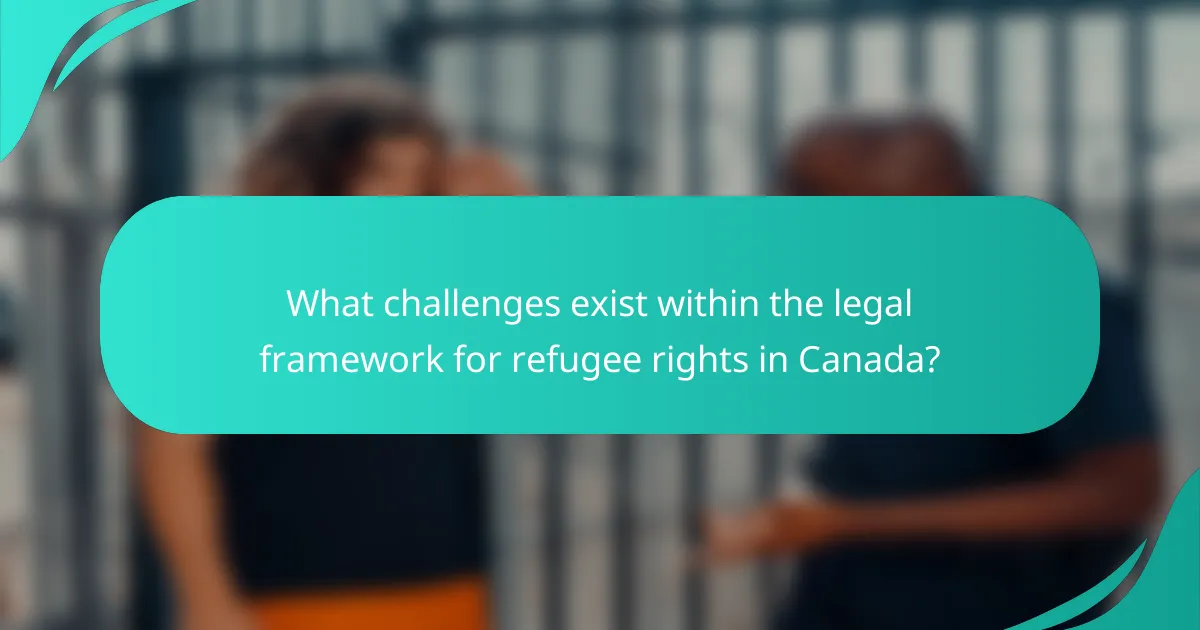
What challenges exist within the legal framework for refugee rights in Canada?
The legal framework for refugee rights in Canada faces several challenges. One challenge is the lengthy processing times for refugee claims, which can exceed a year. This delay can lead to prolonged uncertainty for claimants. Another challenge is the complexity of the legal system, making it difficult for refugees to navigate without legal assistance. Additionally, there are inconsistencies in decision-making among different adjudicators. This inconsistency can result in similar cases receiving different outcomes. Furthermore, there are limitations in access to social services for refugees during the claim process. These barriers can hinder their ability to integrate into Canadian society. Lastly, public sentiment and political discourse can influence refugee policies, sometimes leading to stricter measures. These challenges collectively impact the effectiveness of the legal framework in protecting refugee rights in Canada.
What barriers do refugees face in accessing their rights?
Refugees face multiple barriers in accessing their rights. These barriers include legal obstacles, language difficulties, and lack of awareness. Legal obstacles often stem from complex immigration procedures. Many refugees struggle to navigate these systems without proper legal assistance. Language difficulties hinder effective communication with authorities and service providers. This can lead to misunderstandings and missed opportunities for support. Additionally, many refugees are unaware of their rights due to limited access to information. Cultural differences can also create challenges in understanding the legal framework. These barriers collectively impede refugees from fully exercising their rights in Canada.
How do systemic issues affect the processing of refugee claims?
Systemic issues significantly hinder the processing of refugee claims. These issues include bureaucratic inefficiencies, resource limitations, and inconsistent application of policies. Delays in processing can lead to prolonged uncertainty for claimants. A lack of trained personnel contributes to errors and oversights in decision-making. Furthermore, systemic biases may affect the fairness of assessments. Studies indicate that marginalized groups face additional obstacles in the refugee determination process. For example, a report by the United Nations High Commissioner for Refugees highlights that systemic barriers can result in lower acceptance rates for specific demographics. Addressing these systemic issues is crucial for ensuring timely and equitable processing of refugee claims.
What are the implications of public policy changes on refugee rights?
Public policy changes significantly impact refugee rights by altering legal protections and access to services. For example, stricter immigration policies can lead to reduced asylum applications and increased deportations. Changes in funding for refugee support programs can diminish resources available for legal aid and integration services. Additionally, shifts in public sentiment, influenced by policy, can affect societal attitudes towards refugees, potentially leading to discrimination. Historical instances, such as Canada’s Safe Third Country Agreement, demonstrate how policy decisions can restrict refugees’ ability to claim asylum. These implications highlight the importance of monitoring and advocating for refugee rights amidst evolving public policies.
How can refugees advocate for their rights within this framework?
Refugees can advocate for their rights within the legal framework in Canada by engaging with legal aid services. These services provide essential support for understanding legal processes. Refugees should also participate in community organizations that focus on refugee rights. These organizations often offer resources and training for effective advocacy.
Additionally, refugees can utilize social media platforms to raise awareness about their rights. Sharing personal stories can mobilize public support and influence policy changes. Attending public hearings and consultations allows refugees to voice their concerns directly to decision-makers.
Furthermore, refugees can collaborate with legal professionals to navigate the complexities of the legal system. This collaboration can lead to more effective representation in legal matters. Engaging with local advocacy groups can amplify their voices in broader discussions on refugee rights.
By taking these steps, refugees can actively participate in the advocacy process and promote their rights within the existing legal framework.
What resources are available for legal assistance?
Legal assistance resources include legal aid services, nonprofit organizations, and law clinics. Legal aid services provide free or low-cost legal representation to those who qualify. Nonprofit organizations often offer pro bono legal help and guidance on refugee rights. Law clinics at universities allow law students to gain experience while assisting clients under supervision. These resources are crucial for refugees navigating the legal system in Canada. Access to legal assistance helps ensure that refugees understand their rights and receive proper representation.
How can community organizations support refugee rights?
Community organizations can support refugee rights by providing legal assistance and advocacy. They can help refugees understand their rights under Canadian law. Many organizations offer free legal clinics to assist with claims and appeals. They also provide resources on navigating the immigration system. Additionally, community organizations create awareness about refugee issues. They engage in public education campaigns to foster understanding and support. Collaboration with local governments can enhance refugee services. Data shows that organizations significantly improve access to rights and resources for refugees.
What best practices can improve the legal framework for refugee rights in Canada?
Best practices to improve the legal framework for refugee rights in Canada include enhancing access to legal assistance. Providing refugees with free legal aid can help them navigate the complex asylum process. Training immigration officials on cultural sensitivity and refugee issues is essential. This can lead to fairer and more compassionate decision-making. Establishing clear guidelines for refugee claim processing will reduce delays and uncertainty. Regularly reviewing and updating policies ensures they reflect current international standards. Engaging with refugee communities allows for feedback and improvement of services. Collaboration with NGOs can enhance support systems for refugees. These practices collectively strengthen the legal framework and support refugee rights effectively.
How can policy reforms enhance protection for refugees?
Policy reforms can enhance protection for refugees by establishing clearer legal frameworks. Clearer frameworks can lead to improved access to asylum processes. Enhanced legal protections can reduce the risk of refoulement, where refugees are returned to dangerous situations. Reforms can also increase funding for refugee services and integration programs. Increased funding can support mental health services and legal assistance for refugees. Additionally, reforms can promote collaboration among governmental and non-governmental organizations. Collaborative efforts can lead to better resource allocation and support systems for refugees. Historical data shows that countries with comprehensive refugee policies have higher rates of successful integration. For instance, Canada’s 2017 reforms led to a 30% increase in refugee applications processed within a year.
What role does public awareness play in supporting refugee rights?
Public awareness plays a crucial role in supporting refugee rights. It educates the general public about the challenges refugees face. Increased awareness can lead to greater empathy and understanding. This, in turn, can foster community support for refugee integration. Public support can influence policy changes that protect refugee rights. For instance, advocacy campaigns have successfully raised awareness about refugee issues. These campaigns have resulted in legislative actions aimed at improving refugee protections. Studies show that informed communities are more likely to support inclusive policies. Thus, public awareness directly impacts the legal framework surrounding refugee rights.
The main entity of this article is the legal framework for refugee rights in Canada, primarily governed by the Immigration and Refugee Protection Act (IRPA). This framework outlines the processes for claiming refugee status, defines refugees, and establishes their rights, including protection from persecution based on specific criteria. Key components include the IRPA, the Refugee Protection Division (RPD), and the Canadian Charter of Rights and Freedoms, which collectively ensure fair treatment and access to services for refugees. The article also addresses challenges within the legal system, barriers faced by refugees, and the importance of public awareness and advocacy in supporting their rights.
